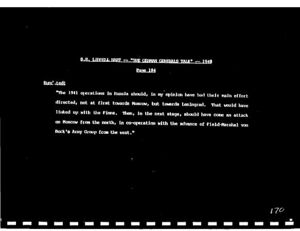Patterns of Conflict
| The works of |
| Works of John Boyd |
|---|
OODA WIKI Edition
Quantico Transcription
And I’m quoting him, on page number, The German Generals Talk.[1] Note this, he’s quoting Von Rundstedt. “The 1941 operations in Russian should, in my opinion, have had their main effort directed, not at first towards Moscow but towards Leningrad.” In other words, you’re still going to do it down in the central part of the front, but then you’re going to loop up toward the Leningrad area, and then you’re going to roll up the northern wing of the Russian forces against the Baltic. The Germans controlled the Baltic at that time, and you’d wipe them out.
And then, after you got that whole area up there set up, you’re going to have a second phase of the operation, a two pronged phrase, two large prongs, many pronged, and you’re going to loop down out of the Leningrad area, and also the one coming in from the west. And that way, you’re going to bag, you’re going to roll up the whole front from north to south. And the advantage of that is, the Russian communications, the railroads and that were very good down that front, so they could not only have a good port for all that having it, but they just roll up the whole front. [20:00] And just like a huge goddamn Venetian blind, take out the whole front, all the way down to the Sea of Azov. Just pumping them in, roll up, pump them in and roll up.
But then what we don’t know is whether they thought about it ahead of time. And the advantage to that is one, the Germans controlled the Baltic, two, the communications up north were better so they could make that operation, three, the other advantage of it is because the north-south communications were very good, where they had a problem with that transportation going directly into Russia, the railroads, the roads, and all that kind of stuff.
And so we saw, what I don’t know is whether that was proposed ahead of time. I looked it up very carefully, I couldn’t see it, it looks like Rundstedt prodded this after the fact, not before the fact. Because I talked with Balck, and I mentioned this idea. He says well, he didn’t think so, and I talked to von Mellen [PH], I spent some time with both of them when they were here. And they said no, that was a good idea but he said it wasn’t thought of ahead of time, and it should have been. And Balck said it probably still wouldn’t have worked. He said the operation would have worked, and I said why not, he said very simple. It’s because Hitler, the way he behaved in Russia. He said we probably could have won the other way because the people were on our side, but then he came down heavy-handed with the SS group, and then of course, they turned against him.
Wyly: You know, it’s amazing how many times I’ve found that in military history, where generals after the fact, including a lot of American generals, you know. Some of these ideas, and I’ve done the same thing, I’d look to see if they were thinking about it before. And usually they have but after the fact.
Lightfoot Transcription
- ↑ 44 B. H. Liddell Hart, ''The German Generals Talk'' (New York, NY: William Morrow and Company, 1971).
